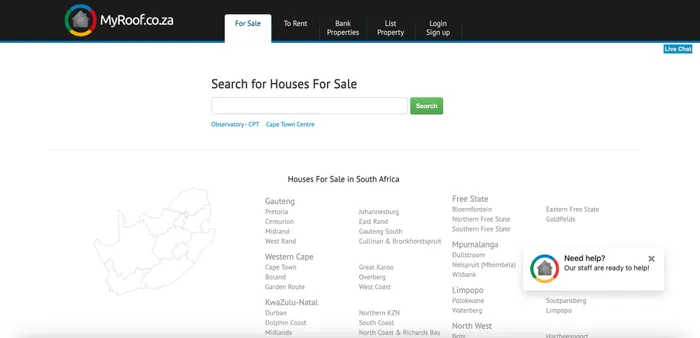What you need to know about buying a distressed property in SA

A popular distressed property site called MyRoof. File
The possibility of buying a home has become even more daunting with the latest interest rate hike.
In late January, the South African Reserve Bank (SARB) added a 25 basis point hike, taking the current prime lending rate to 10.75%.
It is not surprising that home buyers need to look at every avenue to secure their dream home at an affordable price.
Andrea Tucker, Director of MortgageMe, suggests that potential home buyers need to look at distressed or repossessed properties.
“For investors and those looking to finally get a foot on the property ladder, these properties are an opportunity to secure a highly favourable deal – provided you do it sensibly, with a full picture of the pros and cons,” Tucker advises.
What is a distressed property?
According to MortgageMe, banks are keen to find fair and equitable solutions for defaulters, and offer assisted property sales programmes.
This new regime has changed the landscape of distressed sales.
“There are essentially three kinds of ‘distressed’ properties: sales in execution, bank-mandated sales and properties in possession. Each represents a different purchase process and different benefits and advantages for the buyer,” Tucker explains.
“For the seller, it means they have reached the end of the road and are unable to meet the repayments on the property, while the bondholder is looking to recoup their losses.”
Sale in execution
According to the mortgage company statement, “a sale in execution follows a process set in motion by the bank when a borrower has persistently defaulted on their bond repayments. After the bank has secured a judgment against the defaulter, the Sheriff of the Court attaches their moveable assets for auction. If these items do not raise the total amount of arrears, then the property itself becomes a sale in execution”.
“In sales in execution, which are always conducted via auction bids, there is an obligation on the bank to set a minimum reserve price, which has put an end to the practice of selling off properties for ridiculously low sums,” she said.
“Immediately on conclusion of a sale in execution, the buyer is obliged to pay a 10% deposit plus the sheriff’s commission, therefore funds must be available to meet these upfront costs,” adds Tucker.
Bank-mandated sale
“In a bank-mandated sale, when the bond holder is unable to keep up with monthly repayments, they voluntarily hand over the property to the bank to sell on their behalf,” the property company adds.
Tucker notes bank-mandated sales have a more realistic, market-related price.
“The bondholder gives the bank a mandate to sell the property, which in turn appoints an estate agent to effect the actual sale. The seller has the right to decline an offer to purchase, as in any commercial transaction, although if they refuse or are unable to sell the property, the bank may eventually instigate legal proceedings, so most reasonable offers would likely be considered.”
Properties in possession
MortgageMe notes that if a property does not reach its minimum reserve at auction, or does not sell with a bank mandate, then the bank itself will buy it back and it becomes a property in possession, or in other words, repossessed.
“Offers on these properties must be made to the bank via an appointed agent, and can be declined or accepted at the bank’s discretion. Since repossession is a bank’s last resort, it is sometimes more likely they will consider offers on the lower end of the scale,” Tucker notes.
Pros and cons of buying a distressed property according to Tucker
Pros
- Finding an exceptional bargain, possibly in an area you would otherwise not have been able to afford.
- Favourable Ts&Cs, including preferential borrowing rates and no transfer duties (although transfer fees are payable).
- The opportunity for a quick return on your investment if you can ‘flip’ the property and then sell at prevailing market prices.
Cons
- Properties are sold ‘voetstoets’, and what you see is what you get. Owners who have fallen behind with bond repayments may have also neglected the upkeep of the property. ‘What you see’ can be tricky, as access to viewing the properties may be denied by current owners or tenants.
- Offers on distressed properties must be ‘clean’, and therefore not subject to financing, or to the sale of another property.
- The transfer of distressed properties can take more time than a standard house purchase.
- Buyers may be liable for any outstanding levies, rates and taxes.
BUSINESS REPORT
Related Topics: